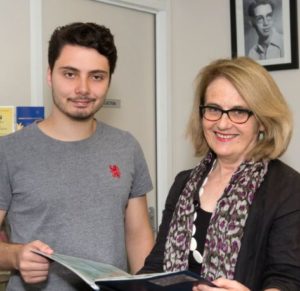
Inspired by the primary source material held in Flinders University’s Dunstan Collection, Yianni Cartledge has produced a historical project of which the late Premier would have warmly approved.
A third-year student studying history as part of his degree in education, Mr Cartledge’s essay tracing the Greek migrants from the island of Ikaria who came to South Australia has won the Wakefield Companion to SA History Undergraduate Essay Prize.
He shares the prize, presented by the SA History Council, with student Carmel Pascale from the University of Adelaide.
Flinders historian Professor Melanie Oppenheimer said the starting point for the essay was a history topic specifically aimed at getting students at undergraduate level to engage with archival material.
“It exposes them to historical practices and the tools of the historian, and then how to work with different sources to construct a story: it’s a really good example of research-based, student-centred learning,” Professor Oppenheimer said.
Investigating allocated source material on immigration in the University Library’s Special Collections sparked Mr Cartledge’s interest.
”Off his own bat he took up the opportunity and just ran with it,” Professor Oppenheimer said.
Mr Cartledge said he traced the history of the Ikarian community using written materials, photographs and interviews, including the records of the local Ikarian community club, which was founded in 1958, as well as a Greek book that featured photos of Ikaria from the late 19th century up to the 1960s.
“There wasn’t heaps of information, but what I had was pretty good,” said Mr Cartledge, who has Ikarian ancestry.
His research revealed the first arrivals from Ikaria reached Adelaide as early as 1910, and found that with the encouragement of each previous wave of migrants, South Australia became a ‘hotspot’ for Ikarian settlement in Australia. The essay portrays a highly active, supportive and generous community.
Mr Cartledge concludes that Ikaria, which some observers considered to be the poorest island in the Mediterranean, has “produced one of South Australia’s oldest and most influential Mediterranean communities”.

